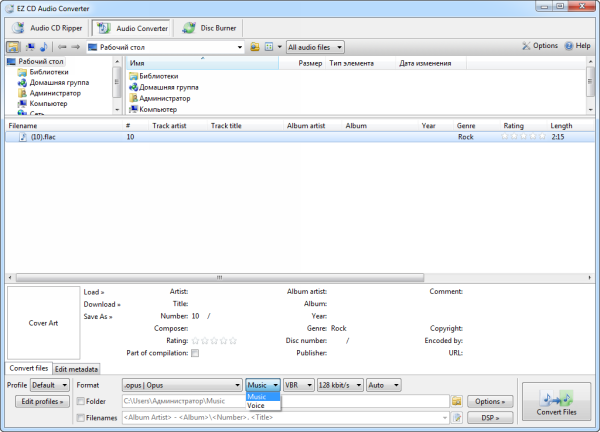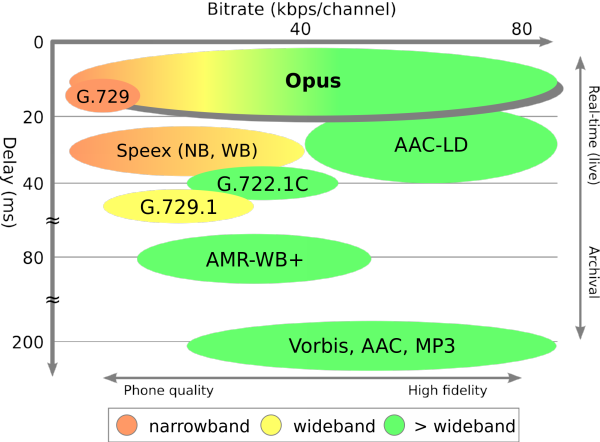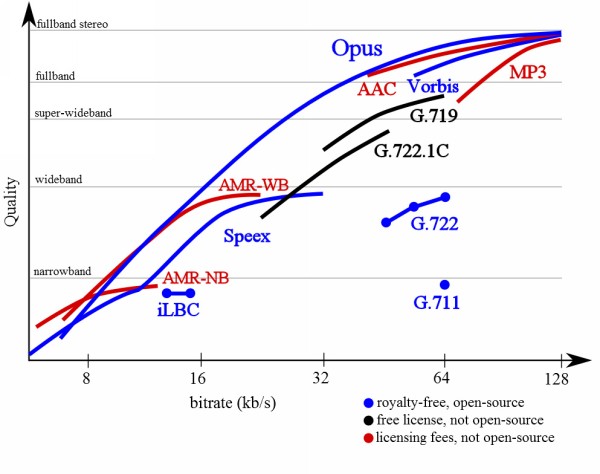Certain discoveries made by man, are so practical inventions that are in everyday life for long.
For example, the standard MP3 digital audio compression for about 20
years, which by the standards of computer technology - over the long
term. Over the last twenty years there has been a lot of discoveries and technological breakthroughs. But for digital audio, oddly enough, not much has changed.
MP3 «climbed" to all devices, which only you can - smart phones,
portable media players, DVD-players, watches and other electronic
devices.
Why is that? After coding with losses - is the inevitable deterioration of sound quality. An ordinary man in the street might well seem that long ago, there are alternatives MP3 - FLAC, APE and other audio data compression algorithm with the ability to restore an identical waveform after decoding. Judgment that the emergence of algorithms Lossless Audio MP3 will compete in all respects - very superficial. In addition to sound quality, for which so upset fans music collection, there are many other objective reasons that MP3 can not be forgotten and replaced by the principles of lossless compression.
First of all, because the format of the audio coding losses are used not only for music but also for the transmission of voice through the Internet. Trump MP3 and other lossy compression mechanisms - effective use of the transmission channels. To organize IP-telephony, ensure coherent speech to as many subscribers. The sound quality is of secondary importance. In addition, a very important opportunity to "instant" decoding, without which hampered synchronous communications. In this case, the use (even theoretically) lossless compression algorithm would lead to a strong time delays, and interactive communication would be impossible.
However MP3 is not without flaws. It's no secret that low bitrate "eats" part sound, giving it also a whole set of unpleasant artifacts - overtones, whistles and bells, all kinds of distortions. When using the MP3 in IP-telephony there are large delays due to the need for additional buffering.
 Opus structure allows it to deal effectively with audio artifacts. For this has been offered a multi-stage processing architecture audio. The main argument, which speaks in favor of the new codec for IP-telephony - low latency.
Opus structure allows it to deal effectively with audio artifacts. For this has been offered a multi-stage processing architecture audio. The main argument, which speaks in favor of the new codec for IP-telephony - low latency.
Most of the work on the creation of a unique compression algorithm were several people: Jean-Marc Valin (Xiph.Org, Octasic, Mozilla Corporation), Koen Vos (Skype) and Timothy B. Terriberry (Xiph.Org, Mozilla Corporation). Not without the ubiquitous Google - according to the creators of Opus, the Internet giant has provided considerable support for the development and testing of the codec.

First engine (SILK) is used for voice compression, as well as in those cases that require efficient use of the bandwidth of the link. The processed audio codec is analyzed for the presence of human speech. Voice components are separated from the other sounds, then the codec analyzes the frequency response of the sound by lowering the sampling data containing voice information that is it. Opus then examines present noise and optimizes the signal for a certain bitrate. Next codec converts the signal with a pre-filter. Using speech frames prediction unit frequency audio signal changes the subsequent frames, and then the frequency quantization normalized frequencies of human speech. What follows is an important stage of sound processing - eliminating distortions in high enough bitrate. After this module is used form of quantization noise, which reduces noise within the operating band, forcing them out of the operating range. In the final phase of the interval encoding SILK works with discrete values, which can take a limited number of values - by-frame output signal.
During encoding audio data with high quality, such as music, the module is activated CELT. Its mechanism is similar to the principle of the most popular codecs and losses tied to the discrete cosine transform, as well as to "optimize" the sound. The latter consists in the fact that the components are removed from the signal, not carrying a payload for the human ear - before encoding them or he does not hear, or hear with great difficulty.
If you look at the encoding settings, such as the program EZ CD Audio Converter (formerly Easy CD-DA Extractor), you can see that a new codec allows you to choose the compression mode - a sound or music. This setting determines the priority of a particular encryption algorithm Opus.
 Opus supports sample rates from 8 to 48 kHz. Audio encoding bit rate can be adjusted from 6-510 kb / s. The duration of training varies from 2.5 to 20 ms.
Opus supports sample rates from 8 to 48 kHz. Audio encoding bit rate can be adjusted from 6-510 kb / s. The duration of training varies from 2.5 to 20 ms.
Codec encodes in mono and stereo, using the technology of constant and variable bit rate compression and supports up to 255 channels.
 And this is - a graph showing the superiority of Opus other codecs for audio quality.
The test results indicate that the audio decoded by Opus, in most cases
more fully restores the original picture of the sound - at different
bit rates and at different frequencies. The terms fullband stereo and narrowband boundary means the sampling frequency.
And this is - a graph showing the superiority of Opus other codecs for audio quality.
The test results indicate that the audio decoded by Opus, in most cases
more fully restores the original picture of the sound - at different
bit rates and at different frequencies. The terms fullband stereo and narrowband boundary means the sampling frequency.
 Talking about the advantages of the new codec, it should be noted and
the stability of its work in different environments, which is especially
important in the transmission of data over wireless networks.
Opus has a flexible algorithm to adapt to changing channel capacity, so
the sound quality remains unchanged, and the codec itself partially
compensate for the loss, providing broadcast smoothly.
Talking about the advantages of the new codec, it should be noted and
the stability of its work in different environments, which is especially
important in the transmission of data over wireless networks.
Opus has a flexible algorithm to adapt to changing channel capacity, so
the sound quality remains unchanged, and the codec itself partially
compensate for the loss, providing broadcast smoothly.
The nearest alternative firmware versions for portable audio devices Rockbox is also support for Opus. Fans can listen to music and audio books on iPods iPod, Archos and others. On handheld devices running Android will also be listening to audio through the Rockbox , by setting the appropriate application RaaA (Rockbox as an Application).
At the moment, the new codec is already supported in the development of Mozilla - Firefox and Thunderbird. Obviously, the support of Opus will soon be seen in other browsers. In the near future it will appear in Skype.
Opus: a spoke in the wheels
The apparent superiority of quality, which shows Opus encoding does not mean his landslide victory. This codec has not got rid of all the bugs and only in September this year was certified in IETF (Internet Engineering Task Force) as the standard audio codec for use on the Internet.
In addition, the new design has yet to "wrestle" with numerous claims and lawsuits that can be expected in the future. Opus has the status of royalty-free, that is, its use does not need to pay any royalties owners. The appearance of the product, of course, many unprofitable competitors.
The first "buzotery" has spoken out against the new codec - Qualcomm and Huawei said that the new development violates patents held by them. Developers Opus gave comments on this, saying that they did not violate copyright and more - they expect that such statements and are ready to defend their case.
Codec Opus, of course, a great future. Low distortion, and minimal compared with competing algorithms, the time delays - all this makes Opus ideal for integration of this technology in the field of IP-telephony and broadcast speech.
However, most of all, of such magnitude that accompanied the victorious march of MP3, «Opus" is unlikely to be achieved. At the time, the emergence of MP3 codec has been a real revolution in the storage and transmission of sound. Today is a new codec can only offer more efficient use of channels at low speeds. As for musical tastes, I suppose, fans portable audio will remain on his - the sound should be no losses. Even the developers do not deny.
The presentation Opus says the following: "The codec can be used for any purpose, except for Lossless-preservation (use FLAC) and except for ultra-bitrate encoding (use codec2)».
Opus hardware support will be required. After all parameters in the new codec are excellent, and so in the near future we can expect a new technology in wireless headphones and portable music players, we will continue to call on the old MP3-player.
Why is that? After coding with losses - is the inevitable deterioration of sound quality. An ordinary man in the street might well seem that long ago, there are alternatives MP3 - FLAC, APE and other audio data compression algorithm with the ability to restore an identical waveform after decoding. Judgment that the emergence of algorithms Lossless Audio MP3 will compete in all respects - very superficial. In addition to sound quality, for which so upset fans music collection, there are many other objective reasons that MP3 can not be forgotten and replaced by the principles of lossless compression.
First of all, because the format of the audio coding losses are used not only for music but also for the transmission of voice through the Internet. Trump MP3 and other lossy compression mechanisms - effective use of the transmission channels. To organize IP-telephony, ensure coherent speech to as many subscribers. The sound quality is of secondary importance. In addition, a very important opportunity to "instant" decoding, without which hampered synchronous communications. In this case, the use (even theoretically) lossless compression algorithm would lead to a strong time delays, and interactive communication would be impossible.
However MP3 is not without flaws. It's no secret that low bitrate "eats" part sound, giving it also a whole set of unpleasant artifacts - overtones, whistles and bells, all kinds of distortions. When using the MP3 in IP-telephony there are large delays due to the need for additional buffering.
Opus: a new word in digital audio
The new open codec Opus denied the most serious shortcomings MP3, while he retained all the advantages of a "people's" codec, and even increase them. 
Most of the work on the creation of a unique compression algorithm were several people: Jean-Marc Valin (Xiph.Org, Octasic, Mozilla Corporation), Koen Vos (Skype) and Timothy B. Terriberry (Xiph.Org, Mozilla Corporation). Not without the ubiquitous Google - according to the creators of Opus, the Internet giant has provided considerable support for the development and testing of the codec.

One of the founders of the codec Opus - Jean-Marc Valin
The engine of the new codec is based on two independent standard
proposed Xiph.Org Foundation and Skype Technologies SA (owned by
Microsoft). New codec is a hybrid solution, it combines technology codec CELT (Constrained Energy Lapped Transform) and SILK. The latter is used to implement communication in Skype.
How does Opus
The principle of the codec is not new, but the original and most
importantly - allows you to get a very good result at the output. Incoming signal is encoded SILK or CELT selectively. First engine (SILK) is used for voice compression, as well as in those cases that require efficient use of the bandwidth of the link. The processed audio codec is analyzed for the presence of human speech. Voice components are separated from the other sounds, then the codec analyzes the frequency response of the sound by lowering the sampling data containing voice information that is it. Opus then examines present noise and optimizes the signal for a certain bitrate. Next codec converts the signal with a pre-filter. Using speech frames prediction unit frequency audio signal changes the subsequent frames, and then the frequency quantization normalized frequencies of human speech. What follows is an important stage of sound processing - eliminating distortions in high enough bitrate. After this module is used form of quantization noise, which reduces noise within the operating band, forcing them out of the operating range. In the final phase of the interval encoding SILK works with discrete values, which can take a limited number of values - by-frame output signal.
During encoding audio data with high quality, such as music, the module is activated CELT. Its mechanism is similar to the principle of the most popular codecs and losses tied to the discrete cosine transform, as well as to "optimize" the sound. The latter consists in the fact that the components are removed from the signal, not carrying a payload for the human ear - before encoding them or he does not hear, or hear with great difficulty.
If you look at the encoding settings, such as the program EZ CD Audio Converter (formerly Easy CD-DA Extractor), you can see that a new codec allows you to choose the compression mode - a sound or music. This setting determines the priority of a particular encryption algorithm Opus.

Codec encodes in mono and stereo, using the technology of constant and variable bit rate compression and supports up to 255 channels.
Opus: visual victory
Universal structure codec Opus allowed him to bypass the low bitrate
most major competitors - Apple HE-AAC, Nero HE-AAC, Vorbis and AAC LC. In this diagram you can see how much better the delay parameters in the new codec in comparison with competitors. 

Software for working with Opus
Software developers are slow to release updates to support the codec Opus.
Such popular tools for working with sound, as EZ CD Audio Converter,
foobar2000, AIMP, VLC Media Player, already can work with files in this
format. New codec adopted for the organization and streaming through Icecast, it is included in the K-Lite Codec Pack and Filters LAV. The nearest alternative firmware versions for portable audio devices Rockbox is also support for Opus. Fans can listen to music and audio books on iPods iPod, Archos and others. On handheld devices running Android will also be listening to audio through the Rockbox , by setting the appropriate application RaaA (Rockbox as an Application).
At the moment, the new codec is already supported in the development of Mozilla - Firefox and Thunderbird. Obviously, the support of Opus will soon be seen in other browsers. In the near future it will appear in Skype.
Opus: a spoke in the wheels
The apparent superiority of quality, which shows Opus encoding does not mean his landslide victory. This codec has not got rid of all the bugs and only in September this year was certified in IETF (Internet Engineering Task Force) as the standard audio codec for use on the Internet.
In addition, the new design has yet to "wrestle" with numerous claims and lawsuits that can be expected in the future. Opus has the status of royalty-free, that is, its use does not need to pay any royalties owners. The appearance of the product, of course, many unprofitable competitors.
The first "buzotery" has spoken out against the new codec - Qualcomm and Huawei said that the new development violates patents held by them. Developers Opus gave comments on this, saying that they did not violate copyright and more - they expect that such statements and are ready to defend their case.
Conclusion
After 20 years of MP3 people still can not hear the difference between
the original sound and the sound, which suffered losses as a result of
compression. Yet he constantly looking for ways to improve the quality of digital sound and to minimize losses at the same bitrate. Codec Opus, of course, a great future. Low distortion, and minimal compared with competing algorithms, the time delays - all this makes Opus ideal for integration of this technology in the field of IP-telephony and broadcast speech.
However, most of all, of such magnitude that accompanied the victorious march of MP3, «Opus" is unlikely to be achieved. At the time, the emergence of MP3 codec has been a real revolution in the storage and transmission of sound. Today is a new codec can only offer more efficient use of channels at low speeds. As for musical tastes, I suppose, fans portable audio will remain on his - the sound should be no losses. Even the developers do not deny.
The presentation Opus says the following: "The codec can be used for any purpose, except for Lossless-preservation (use FLAC) and except for ultra-bitrate encoding (use codec2)».
Opus hardware support will be required. After all parameters in the new codec are excellent, and so in the near future we can expect a new technology in wireless headphones and portable music players, we will continue to call on the old MP3-player.





0 commentaires:
Enregistrer un commentaire